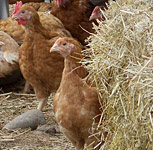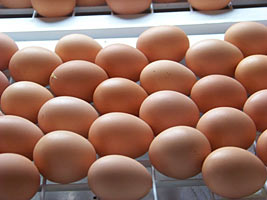
 Pigs came to the Americas with the Europeans and have been valued ever since colonial times for their meat, bones, and lard, which was used for cooking, lamp oil, candles, and soap. Until the 1940s, most hogs were raised on small family farms.
Pigs came to the Americas with the Europeans and have been valued ever since colonial times for their meat, bones, and lard, which was used for cooking, lamp oil, candles, and soap. Until the 1940s, most hogs were raised on small family farms.
Things have changed significantly and today, we "process" pigs as an industrial commodity. Jammed into unspeakably close quarters, fed unnatural diets and antibiotics, they produce millions of tons of chemical-laden waste that pollute land, rivers and streams throughout the Midwest, Great Plains, and Carolinas. Consumers see lower prices, but not the hidden costs-the inhumane conditions for the animals and workers, and environmental disasters. It's the dark side of "the other white meat."
When Nash was young, pigs were a hedge against a low corn price. A family farmer with a 200-acre farm would devote about 40 acres to raising corn. The corn could be sold for much needed cash, or, if the price was too low, be stored. The farmer would breed his sow and four months later have a dozen new piglets that would eat and grow fat on the corn and be butchered to feed the family. Every part of the hog was used-lard was used to make soap, skin was made into cracklins, the intestines were used for sausage, and the meat was smoked, boiled and jarred, or salted raw in barrels. The bones were ground up and used to fertilize gardens. As a young 4-H member, Nash raised several hogs by himself and in about 2000, he decided to add them to his own farm's operation.
 Pigs play an integral role in the nutrient cycle at Nash's Organic Produce. Raised on pasture, they clear fields of old crops, aerate the soil, and contribute to the fields' fertility. They are fed the farm's own organic barley along with excess whey from Mount Townsend Creamery in Port Townsend, WA. They are antibiotic- and hormone-free.
Pigs play an integral role in the nutrient cycle at Nash's Organic Produce. Raised on pasture, they clear fields of old crops, aerate the soil, and contribute to the fields' fertility. They are fed the farm's own organic barley along with excess whey from Mount Townsend Creamery in Port Townsend, WA. They are antibiotic- and hormone-free.
If produce does not sell at the markets or the store, it is fed to the pigs or chickens and converted into pork or eggs. Nothing is wasted. The pigs are pasture-raised, free to root around, wallow in the mud or lay in the sun. They live very differently from their unfortunate cousins in the terrible conditions of the industrial confined animal feeding operations (CAFOs).
Read about what animals in the industrial ag system are fed in this thought-provoking article in the Huffington Post.
 |
Learn more about purchasing Nash’s tasty Dungeness pork for your family: | |
| * Read our Pork Brochure | ||
| * Ask about our Pork Buying Club | ||
| * | Visit the Farm Store daily from 9am to 7pm; or our Farmers Markets | |
| * Call (360) 681-7458 | ||
Nash’s excellent pork is available to you directly from the farm, “on the hoof” by the whole or half hog. Reserve this delicious pork by calling our sales desk at 360-681-7458.
You may purchase Nash’s USDA-approved pork by the cut at our Farm Store or at any of our Peninsula Farmers Markets.

Nash’s Pork Buying Club started in 2012. For a $25 deposit, we add the customer’s name to our list of pork buying club members and when we have 8-10 members, we assign them a market-ready pig. Each household gets as close to the same cuts as possible. You can sign up at Nash’s Farm Store, any of our farmers markets or our online Buying Club.
 When Nash was young, his family raised chickens for home use. The chickens provided fresh protein all summer long. Today, the chickens diversify the protein sources on the farm any time of the year and eggs have become another revenue source.
When Nash was young, his family raised chickens for home use. The chickens provided fresh protein all summer long. Today, the chickens diversify the protein sources on the farm any time of the year and eggs have become another revenue source.
The chickens at Nash's eat a blend of the farm's organic grains, whey from the Mount Townsend Creamery, and whatever they can find to eat in the pastures, including a hearty dose of insects, worms and grass. They have daily access to the outdoors and take full advantage of it. Their eggs are healthy and tasty, with richly colored yolks, indicating the presence of lutein and high concentrations of fat-soluble vitamins. Real free-range chickens produce eggs with four to six times the vitamin D and a third less cholesterol as their mass-market counterparts. They also lead happier and more natural lives.
They have daily access to the outdoors and take full advantage of it. Their eggs are healthy and tasty, with richly colored yolks, indicating the presence of lutein and high concentrations of fat-soluble vitamins. Real free-range chickens produce eggs with four to six times the vitamin D and a third less cholesterol as their mass-market counterparts. They also lead happier and more natural lives.
Nash's eggs are available seasonally at our farmers markets and at our Farm Stand.



